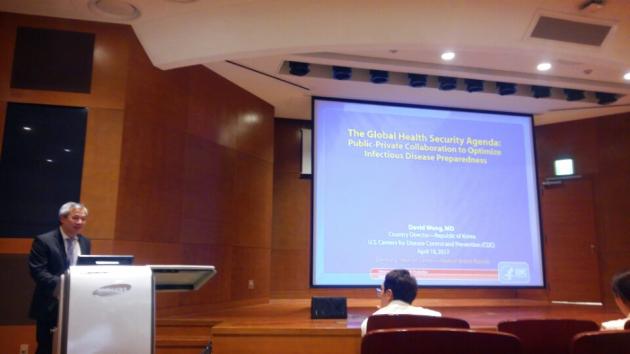“Emergency is not the time to be exchanging business cards,” said a U.S. health expert working in Korea, proposing private and public sectors cooperate to prepare for epidemics before they occur.
At a workshop in Samsung Medical Center Wednesday, David Wong, country director for Korea at the U.S. Centers for Disease Control and Prevention, cited the 9/11 as an example.
“When the twin towers began falling on Sept. 11, 2001, doctors, nurses, and healthcare providers rushed to New York to serve as an emergency aid,” he said. “However, most were turned away because no one could identify whether they were doctors, and no one had time to check for credentials.”

Wong believes that the same situation applies to epidemics. The private sector, although equipped with technology, trained personnel, and robust internal systems, is underutilized in the fight against infectious diseases, he said. Moreover, little communication occurs between the private and public sector, making epidemics hard to control, Wong added.
“For infectious diseases, time, communication, and transparency are of the essence,” he said. “However, the lack of transparency has been a critical problem, with public and private partnerships unwilling to share information with each other or the public in fear that it may reflect poorly on the institution, officials, or the nation itself.”
As a prime example miscommunication in Korea, many experts criticized the government’s handling of the Middle East Respiratory Syndrome outbreak in 2015, which infected 186 people and killed 36 others. The experts pointed to slow government response, asymmetry of information between public and private sectors, and lack of professionals and facilities to deal with the outbreak as the reasons to why the outbreak hit the country at full force.
Wong pointed to the MERS epidemic, citing the importance of “multi-sectoral” cooperation where public and private sectors work together and share information. The anthrax attack that occurred in the U.S. in the 2000s is another example, Wong said, noting that law enforcement entities like the police had been unwilling to work with the public health sector to handle the nationwide terror.
The CDC has aimed to solve these problems through establishing the “Private Sector Roundtable” (PSRT), which seeks to join public and private entities in the fight against epidemics.
“It is very early in development and is still figuring out the path forward – looking for opportunities and projects to engaged,” says Wong. “In particular, we want more from Asia and particularly in Korea as an important partner in workforce development and hospital infection control training.”
In this regard, Wong believes Korea’s private sector can lend more than just a helping hand in this field, citing the need for private hospitals like Samsung Care Center to promote global health and share its information with others.
“A lot of the stuff that Samsung is already doing should be commended. I encourage Samsung Medical Center to share its expertise with other hospitals and other countries,” the U.S. CDC liaison said.
In the case of Korea, Wong points out the immediacy of installing cross-communication systems, saying that the country may be facing an epidemic in the upcoming Olympics, a worldwide event that invites people from all over the world.
“We particularly encourage Korea to be prepared for bioterrorism ahead of the Olympics, which is a high-profile event,” Wong said, stating that this would be a crucial make or break moment. “Korea can use the Olympics as a figurative carrot to facilitate private and public partnerships beforehand.”
Korea is currently the chair of the steering committee of the General Health Safety Agenda (GHSA), launched in February 2014 and endorsed by the G7 in June 2014, to bring countries together to make concrete commitments toward securing the world against infectious diseases and prioritizing global health security.

